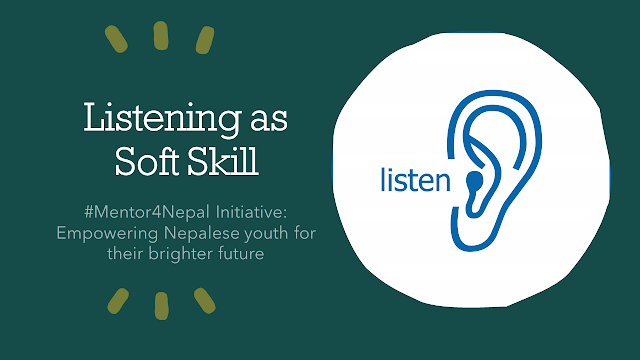Listening as soft skill
Listening is a soft skill that has been recognized as essential for success in the workplace for the past 30 years. In fact, a study by the World Economic Forum found that listening is one of the top 10 skills that will be most in demand by employers in 2025.
There are many reasons why listening is such an important soft skill. First, it allows us to build relationships with others. When we listen attentively to someone, we are showing them that we value their thoughts and feelings. This can help to create a sense of trust and rapport, which is essential for any successful relationship.
Second, listening helps us to learn and grow. When we listen to others, we are exposed to new ideas and perspectives. This can help us to challenge our own thinking and to develop new skills and knowledge.
Third, listening can help us solve problems more effectively. When we understand the other person's point of view, we are better able to find solutions that work for everyone involved.
There are many different types of listening, each with its own purpose. Some of the most common types of listening include:
- Active listening: This is the most effective type of listening. It involves paying attention to the speaker's words, body language, and tone of voice. It also involves asking clarifying questions and summarizing the speaker's points.
- Empathetic listening: This type of listening involves putting yourself in the speaker's shoes and trying to understand their feelings. It is important to be non-judgmental and to avoid trying to fix the speaker's problems.
- Critical listening: This type of listening involves evaluating the speaker's message. It involves considering the evidence that the speaker is presenting and whether or not it is credible.
- Discriminative listening: This type of listening involves distinguishing between important and unimportant information. It is crucial to be able to focus on the critical points that the speaker is making.
Listening is a skill that can be learned and improved with practice. There are many resources available to help you improve your listening skills, such as books, articles, and online courses.
If you want to be successful in the workplace, it is important to develop your listening skills. By listening attentively to others, you can build relationships, learn and grow, and solve problems more effectively.
Here are some tips for improving your listening skills and becoming a better communicator:
- Pay attention to the speaker's body language and tone of voice. These can often tell you as much as the words they are saying.
- Don't interrupt. Let the speaker finish their point before you respond.
- Ask clarifying questions. This shows that you are paying attention and that you want to understand what the speaker is saying.
- Summarize the speaker's points. This helps to ensure that you have understood them correctly.
- Be non-judgmental. Avoid criticizing or dismissing the speaker's ideas.
- Take notes. This can help you to remember what the speaker said and to identify the key points.
- Listen to yourself. Pay attention to your own listening habits and identify areas where you can improve.
- Be patient. Listening takes time and effort. Don't expect to be perfect overnight.
Some additional tips to improve listening skills for students:
- Pay attention in class. This means taking notes, avoiding distractions, and participating in discussions.
- Meet with your professors regularly. This is a good way to get clarification on what you are learning and to ask questions.
- Form study groups. This is a great way to practice listening skills and to get help from your classmates.
- Seek out opportunities to listen to others. This could include attending workshops, lectures, or debates.
- Volunteer your time. This is a great way to listen to people from different backgrounds and experiences.
Listening is a critical soft skill that can help you succeed in both your personal and professional life. By developing your listening skills, you can build relationships, learn and grow, and solve problems more effectively. So next time you are in a conversation, take the time to really listen to what the other person is saying. You may be surprised at what you learn.
#listeningskills #softskills #importanceoflistening #typesoflistening #activelistening #empatheticlistening #criticallistening #discriminativelistening #improvelisteningskills #buildrelationships #learnandgrow #solveproblems #workplacesuccess #careerdevelopment #businessskills #leadershipskills #communicationskills #interpersonalskills #teamworkskills #problemsolvingskills #criticalthinkingskills #creativityskills #innovationskills #futureofwork #M4N #Mentor4Nepal
Declaimer: This article was generated with the help of Bard, a large language model from Google AI. Bard is still under development, and it is not able to generate text that is completely accurate or error-free. The information in this article is for general informational purposes only and should not be considered a substitute for professional advice.
I, Tri Dev Acharya, do not make any representations or warranties of any kind, express or implied, about the completeness, accuracy, reliability, suitability, or availability of the information. Any reliance you place on this information is strictly at your own risk. I will not be liable for any loss or damage arising from the use of this article or any links provided.




Comments
Post a Comment